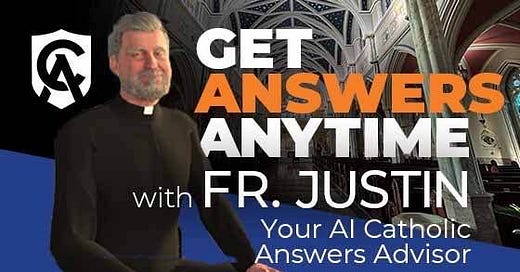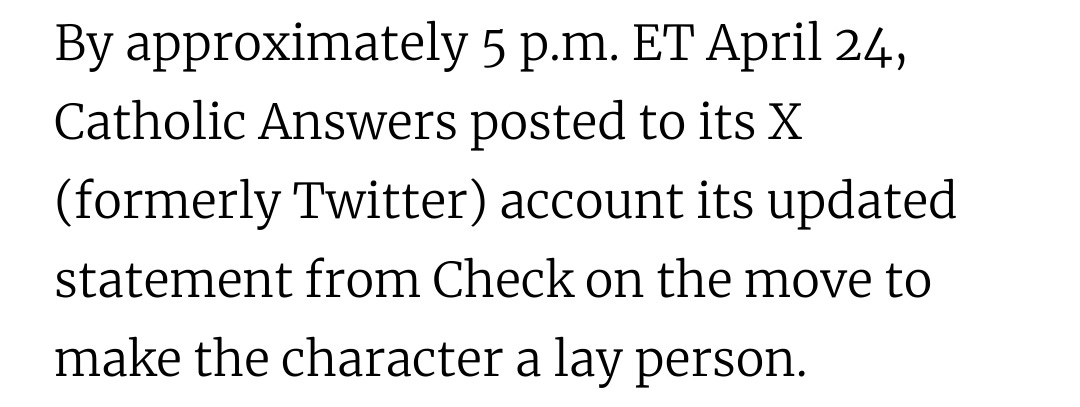Know the star keep SHININ’ and the squid likes GUNS
How the Catholic church can lead the AI revolution
“At first, the YouTube videos look like scenes from Nickelodeon’s popular “SpongeBob SquarePants” cartoon. SpongeBob, the title cheery yellow character, appears outside his pineapple-shaped home, while Mr. Krabs, SpongeBob’s cranky boss, is at the Krusty Krab restaurant he runs. But unlike in the show, the characters in the videos aren’t singing jolly songs about life in the underwater city of Bikini Bottom. Instead, they’re rapping about drugs and guns.”
The passage above, which I have read out loud to myself in a “local newscaster voice” about fifty times in the past week, is the ominous lede from a recent NBC News piece, on how AI superusers are finding more ways to integrate generative artificial intelligence into visual art and music. The above example is a rap song by the artist Glorb which generates the voices of the SpongeBob characters to perform Glorb's written lyrics. Developments like these could have serious implications for how artists are compensated, and whether it's even possible to make a living in the arts anymore. But I must emphasize one important point that the NBC piece doesn't touch at all: the song where SpongeBob and his friends rap about drugs and guns, in fact, goes hard as hell. If you're in public or with children, I wouldn't press play on this until you've turned up your speakers as loud as possible so everybody will know how cool you are:
So Glorb used AI to enhance a piece of art he was making, and it was funny and silly, and yeah, something like this where you train a model on the copyrighted work of writers and voice actors is something where we'll need to regulate and make sure artists get the protections they need. But so far there have been very few “somethings like this” where an AI model has been good and consistent enough to replace the tools we already have; even this song required heavy human input throughout in order to work. And large language models like ChatGPT are running out of training data, so it's not like we're about to make a giant leap forward. I've expressed my skepticism at the effectiveness of generative AI over in The Other Newsletter, and you can read people like Ed Zitron for a clear-eyed look at how the tech and money behind these things actually work, but, in short: we're starting to hit the ceiling of what these models can do in the current data environment, and the ceiling is “funny voices and paragraphs of text that have a lot of mistakes in them”. This, of course, is where the Catholic church comes in.
Last week, an apologetics website named Catholic Answers launched, and then almost immediately un-launched, Father Justin, a Pixar-lookin-ass fake priest powered by generative AI to answer questions about Catholic doctrine. You type in “why should I go to confession?”, he spits out some quotes from magisterial documents; if you're thinking that a search engine could do this just as well…you're not wrong. Father Justin was not especially well-received by CA's existing audience, with complaints ranging from “this guy is saying the wrong things” to “it's weird that you're calling a guy who doesn't exist a priest” to, of course, “this thing doesn't actually work”. As reported by National Catholic Register:
“Some found him creepy. Some didn’t like his voice. Some worried about replacing actual human beings. Some didn’t like his character being a priest…The Register ran into technical problems when it attempted to interact with “Father Justin” on Wednesday. Questions had to be shouted into a laptop microphone, and the app took time to translate them into printed words on the screen. “Eucharist” came out “caressed” and, later, “you, you, you.” “Communion” came across as “commute” and later “commune.”...The Pillar reported that “Father Justin” said it was okay to baptize someone with Gatorade.”
OSV reported something similar:
“Katie Conrad, professor of English at Kansas University, posted on X April 24 that she had gotten "a chatbot + video avatar called 'Father Justin' to claim it is ordained (by an actual living human bishop) & that it can take my confession, absolve me, & marry me.””
Unfortunately, the OSV piece wasn't proofread before it was posted because, at the time of this writing, the piece ended with “By approximately 5 p.m. ET April 24, Catholic Answers posted to its X (formerly Twitter) account its updated statement from Check on the move to make the character a lay person.” Ironically, this gives me a high level of confidence that the OSV piece was written by a live human being.
Look: all of this is very funny. It's Business Idiots all over again, just going “AI seems really hot right now let's put one of those chatbots on our website” and then following that immediately with “shit shit shit shit shit”. It's also very funny because it happened to Catholic Answers, whom I don't hold in high esteem anyways. I first heard of them in 2004, when they were telling Catholics about their sacred duty to support George W. Bush’s re-election campaign, and that supporting his opponent meant supporting “non-negotiable” evils. They've also published one of my favorite headlines - and headline/headshot combinations - in all of Catholic media:
Just don't have an AI priest, guys. Don't have an AI apologist in general. That's not a job that is well-suited to a large language model. Understanding and explaining the Catholic faith is hard, and requires listening to and accompanying people in very different circumstances. A large language model does not think, does not listen, does not feel compassion, and does not reason, despite whatever hype you may have heard. Rather, it ingests whatever data you feed it and then spews out something real-looking based on the probabilities in that data set. A field of Catholic apologetics, or God forbid an entire industry of Catholic apologetics, that ran this way would be an absolute disaster: rather than any sort of listening or understanding or attempt to bring the faith to life, we'd just have hordes of annoying men spewing out quotes from scripture and centuries-old councils based on free-associating off of the title of the topic at hand, convinced that pulling out the right quote or the right turn of phrase would just solve any faith-related probHEY WAIT A SECOND.
I've finally found a second meaningful use case for AI beyond baller-ass Spongebob raps: we should replace every internet “Catholic apologist” with a chatbot. While the folks at Catholic Answers were quick to explain that they never intended to replace the actual human apologists that write pieces or answer user questions on their site with Fr. Justin, I would urge them to do exactly that. When I talk about incoherent explanations on “what love means” from the USCCB, or the bishops’ new strategy of just repeatedly saying “abortion is bad”, or policies on “gender theory” that are riddled with inconsistencies about how we should treat teen girls with dope ass tiddies1, I’m talking about a model of “apologetics” that depends on some sort of by-your-logic, what-about-this-turn-of-phrase, wow-ad-hominem-much approach used in the service of blind condemnation and exclusion, without any connection to what happens to people in the real world outside of imagined arguments, or even the capacity to conceive of things actually happening to people in the real world outside of imagined arguments. And I think we've got a lot of that right now, and I think that a computer can do that just fine, without having to pay human beings for it. It’s very easy to get a computer to spit out a Catholic Answers line like “you have to vote Republican because of abortion”. Hell, I don’t even need ChatGPT for that, I can write an Excel formula.
Look, let me put this as directly as I can: can a computer program ever be smarter than the vast riches of human experience? No. But can a computer program be smarter than Robert Barron, the only bishop in history who has written more books than he's read? Don't you think we're there already, and thus can cut Robert Barron loose from the church's payroll? Ed Zitron wrote that “OpenAI's models continually prove themselves unable to match even the dumbest human beings alive,” but what if we can identify the specific dumbest human beings alive, and they all work in Catholic apologetics? We live in a world where three men on The Catholic Talk Show can patiently explain that they think women should be arrested for getting abortions because “my body my choice doesn't work for shoplifting”; we can, instead, live in a much better world where those three men starve to death.
Malcolm Schluenderfritz even wrote about this at Where Peter Is back in 2022. I mean, he didn’t write about AI or letting podcast hosts starve to death, but he wrote about “apologetics disease”:
“Apologetics can also lead to an over-intellectualization of the Faith if it is not properly balanced by prayer and action. In our hyper-rationalistic age, it is unfortunately common to see the Faith as an intellectual pursuit rather than as a way of life. “Converting to Catholicism” can come to mean “giving assent to a set of propositions” rather than “dropping everything to follow Jesus Christ.”...Christianity is not a system of thought; rather, to be a Christian is to be a disciple. A disciple is one who follows Jesus and tries to imitate him. And so the only answer we can give to the problem of evil must mirror the answer Jesus gave. We can’t explain away the evil in the world, but we can participate in carrying it. We can take the burdens of others upon ourselves. The only answer we can give to the problem of suffering is to show forth through our lives the love, trustworthiness, and “com-passion” of God. Apologetics has its place; it has a long, noble history. But apologetics can not spread the Faith by itself. Rather, the Faith has always been spread by “martyrdom” in the wide sense of the world: by witness.”
Schluenderfritz even quoted Pope Francis speaking on the same topic:
“We want the Gospel to be lived as a grace, a treasure, which we have received freely. We need to ask the Lord to give us the grace to feel as Paul did: to feel that fire, that burning in our hearts, to evangelize. This has nothing to do with proselytizing, not at all. The Church, the Kingdom of God, does not grow by proselytizing. She grows by witness. That means showing by our words and our lives the treasure we have received. That is what it means to evangelize.”
Music is something you play; theology is only as good as what it gets you to do. Apologetics for the sake of providing snappy answers is stupid, we have to live and be real people. Otherwise we’re just cutting and pasting bits of church teaching into a new Google Doc and using that as an excuse for faith, which of course, brings us back to Dignitas Infinita.
I would encourage you to read the new National Catholic Reporter piece by M. Therese Lysaught - Loyola University professor and member of the Pontifical Academy for Life - on Dignitas Infinita. I’ve written favorably about Lysaught’s work before, and while it’s great and angry and funny - an early barnburner sentence is “I was too young at the time to know that the structure of stupidity that I ran into in that sanctuary was everywhere.” - what I appreciate the most is how thorough she is in her critiques of stupid documents from the institutional church. It takes a remarkable level of insight and, for lack of a better term, endurance to read through all of Dignitas and pinpoint the exact moment where the Vatican copy-pasted in a different draft document that contradicts every else they had written so far:
“Dignitas Infinita reads like two documents, shaped by very different perspectives, that were cut-and-pasted together.…both historically and today, real or fictional differences between people have been "ontologized" — projected into their very being and worth — and then used to justify violence, discrimination and other forms of dehumanization. Differences between rich/poor, compatriot/enemy, citizen/migrant, law-abiding/criminal, abled/disabled, healthy/sick, Black/white have provided the basis for death-dealing ideologies of neoliberal economics, militarism, nationalism, slavery, health and more. The first half of Dignitas Infinita upends these claims. It rejects a long list of supposed differences as false constructs. Insisting that all people are equal in ontological dignity, it deems practices premised on supposed differences between persons — e.g., poverty, war, death penalty, torture, human trafficking, sexual abuse, violence against women, abortion, euthanasia and the mistreatment of migrants and people with disabilities — to be gravely wrong.
Until Paragraph 56. Suddenly, difference becomes completely determinative. Gender theory, the document states, is "extremely dangerous" because it "cancels differences" (56). It denies "the greatest possible difference that exists between living beings" — the "foundational difference" — "the greatest imaginable difference" (58) — "the ineliminable sexual difference" (59). Difference. Difference. And in case you missed it ... difference.”
I’m not exaggerating: as Lysaught pointed out, and as Dignitas acknowledges in its own intro, this document was originally drafted as a much shorter piece that was meant to be only focused on issues of bioethics, before Pope Francis ordered the Dicastery for the Doctrine of the Faith to go back and rewrite the document with a broader perspective on human dignity. But they didn’t make a better document, they just stapled a different document to the first one, leaving us with something incoherent, something where the Vatican can’t even establish a definition for what they’re talking about.
“Dignitas Infinita marks the first time the Holy See has issued an authoritative statement that takes up the novel, complex and politically fraught topic of medical interventions for transgender persons. What was needed — and widely hoped for — was a careful, informed and helpful analysis. Instead, the dicastery gave us one jumbled paragraph that demonstrates that it neither knows what it is talking about nor has even begun to conduct a decent theological analysis…ideological commitment to gender complementarity renders the document incoherent in more ways than one. It is precisely this belief that men and women are so utterly, inherently different that is used to justify the horrific violence against women that Dignitas Infinita denounces in Paragraphs 44-46.”
Like I said last week, it’s not just that these passages on (evil music cue) gender theory are going to be used to hurt people and exclude them from the church, it’s that they’re really dumb and poorly argued and poorly written and they don’t even make sense within the context of the same document. The Dicastery for the Doctrine of the Faith does not appear to have done any analysis or reflection or thinking or maybe even reading before writing this document; instead, they ingested a bunch of talking points about gender and Catholicism and spewed out something that looked real based on the probabilities of their data set. ChatGPT could do the same thing in 5 minutes and costs less than whatever salary Cardinal Fernandez draws. The advantages don’t end there: if we want an AI model to run all of the DDF, we could probably train it to internalize the idea that “clergy sexual abuse is bad”, a lesson that Fernandez does not appear to have internalized himself. Plus, I think that with a little effort, we could also get ChatGPT to duplicate some of Fernandez’s earlier and, we’ll say, more compelling work.
Just as the missionaries were on the vanguard of exploring the new world centuries ago, the Catholic church has another opportunity to be the first explorers of yet another new world. They can be the first major world institution to use large language AI models in a way that meaningfully changes their institution. So I urge the Catholic church: fire every apologist, replace them with bots, and make them find jobs that actually do some good in the world; for example, my understanding is that we have a pharmacist shortage in America. Or hell, they don’t need to get jobs right away, they could even take a few weeks off and try, in the words of Glorb, SIPPIN HELLA LEAN, SMOKIN HYDRO. Goddamn that song is so good, run it back one more time:
The joke really landed with some of you so I’m sticking with it.






